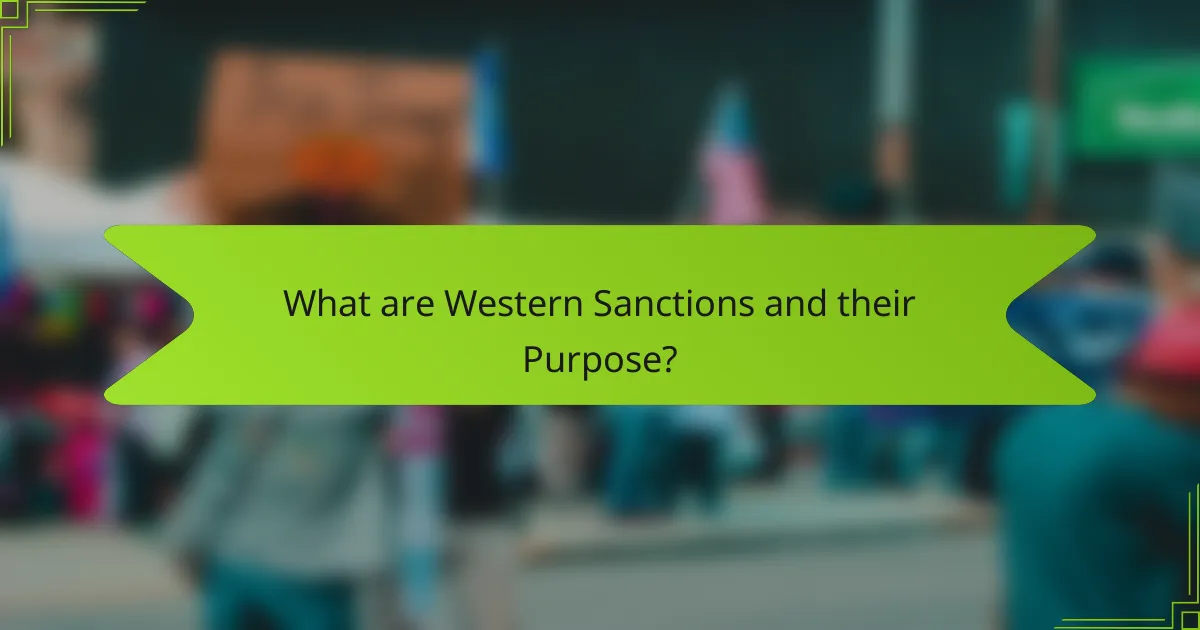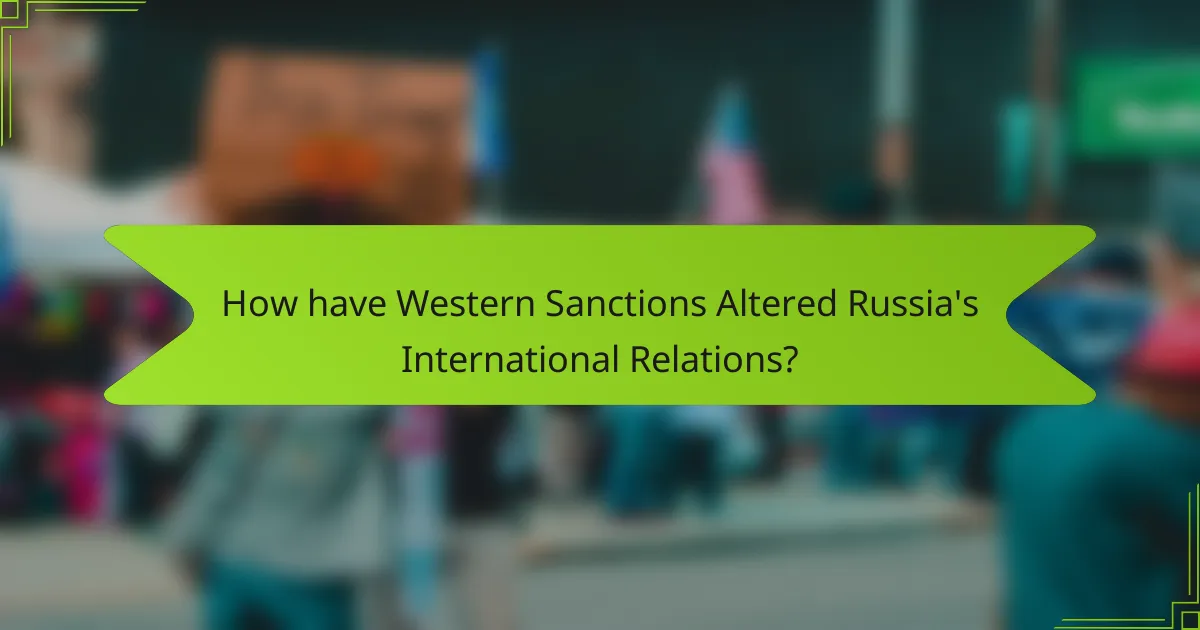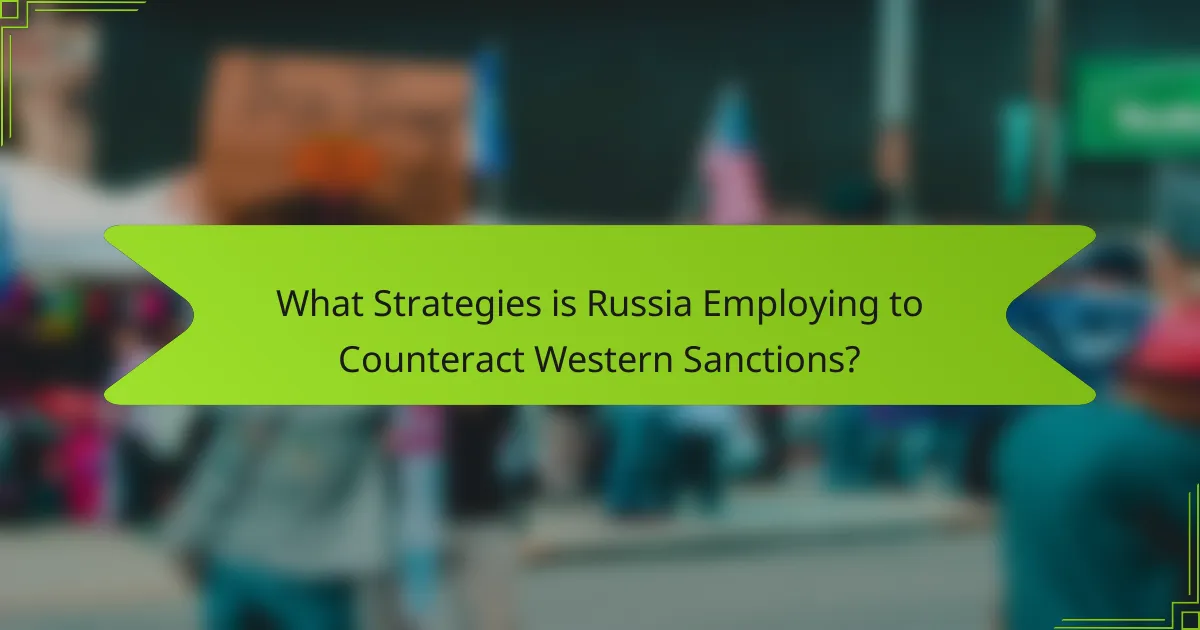Western sanctions are restrictive measures imposed by Western countries to influence the behavior of specific nations in response to actions such as human rights violations or aggression. This article examines the impact of these sanctions on Russia, particularly following its annexation of Crimea in 2014 and its actions in Ukraine. It outlines how sanctions have led to Russia’s isolation from Western economies and prompted the country to strengthen ties with non-Western nations like China and India. Additionally, the article discusses Russia’s strategies to counteract sanctions, including diversifying trade partners, enhancing domestic production, and utilizing alternative financial systems. These developments reflect a significant shift in Russia’s international relations and diplomatic strategies.

What are Western Sanctions and their Purpose?
Western sanctions are restrictive measures imposed by Western countries on specific nations. Their primary purpose is to influence the behavior of those nations, often in response to actions deemed unacceptable, such as human rights violations or aggression. Sanctions can include trade restrictions, asset freezes, and travel bans. They aim to pressure governments to change their policies or actions. For example, sanctions against Russia were implemented following its annexation of Crimea in 2014. These measures seek to isolate the targeted nation economically and politically. The effectiveness of sanctions often varies, depending on the resilience of the targeted economy and international support for the measures.
How do Western sanctions impact Russia’s economy?
Western sanctions significantly harm Russia’s economy. These sanctions restrict access to international financial markets. As a result, Russia faces increased borrowing costs and reduced foreign investment. The sanctions also target key sectors like energy, which is vital for Russia’s revenue. Consequently, oil exports have declined, leading to lower government income. Additionally, the sanctions create inflationary pressures within the country. This inflation affects the purchasing power of Russian citizens. In 2022, the Russian economy contracted by approximately 2.1% due to these sanctions. Overall, Western sanctions contribute to economic instability and hinder Russia’s growth prospects.
What specific sectors are affected by these sanctions?
The specific sectors affected by these sanctions include finance, energy, and defense. The finance sector faces restrictions on transactions with major Russian banks. The energy sector experiences limitations on technology and investment, impacting oil and gas exploration. The defense sector is affected by bans on military exports and cooperation. Additionally, the technology sector encounters export controls that hinder access to advanced technologies. These sanctions aim to weaken Russia’s economic capabilities and influence.
How do sanctions influence trade relations with other countries?
Sanctions significantly alter trade relations between countries. They restrict the ability of targeted nations to engage in international trade. For example, economic sanctions can limit exports and imports, affecting supply chains. This often leads to increased costs for businesses in the sanctioned country. Additionally, sanctions can deter foreign investment due to perceived risks. The United States and European Union sanctions on Russia illustrate this impact. Following the 2014 annexation of Crimea, Russia faced trade restrictions that diminished its access to Western markets. As a result, Russia sought alternative trade partnerships, notably with China. This shift demonstrates how sanctions compel nations to realign their trade relations.
What role do international organizations play in enforcing sanctions?
International organizations play a critical role in enforcing sanctions. They establish frameworks for implementing and monitoring sanctions imposed by member states. The United Nations Security Council (UNSC) is a primary body that authorizes sanctions against countries. It ensures compliance through resolutions that member states must follow. Additionally, organizations like the European Union (EU) coordinate sanctions among their members. They provide legal structures and guidelines for enforcement. International organizations also facilitate information sharing regarding violations. They help in tracking the effectiveness of sanctions over time. This collaborative approach enhances the overall impact of sanctions on targeted entities.
How do organizations like the UN and EU contribute to sanction policies?
Organizations like the UN and EU play crucial roles in establishing and enforcing sanction policies. The UN implements sanctions through Security Council resolutions, which require member states to comply. These resolutions target specific countries, individuals, or entities to maintain international peace and security. The EU complements this by adopting its own sanctions, which often align with UN measures. EU sanctions can include trade restrictions, asset freezes, and travel bans. Both organizations conduct regular assessments to evaluate the effectiveness of sanctions. They also facilitate dialogue among member states to ensure cohesive action. This coordinated approach enhances the legitimacy and impact of the sanctions imposed.
What are the implications of non-compliance with these sanctions?
Non-compliance with these sanctions can lead to severe economic and political consequences. Entities that disregard sanctions may face fines and penalties imposed by sanctioning authorities. Additionally, non-compliance can result in restricted access to international financial systems. This limits the ability to conduct trade and secure investments. Countries may also experience diplomatic isolation from the global community. Historical examples include Iran facing sanctions that severely impacted its economy and international relations. Furthermore, businesses involved in non-compliance may suffer reputational damage and loss of partnerships. Overall, the implications are significant and multifaceted, affecting both economic stability and diplomatic standing.

How have Western Sanctions Altered Russia’s International Relations?
Western sanctions have significantly altered Russia’s international relations by isolating it from Western economies. These sanctions were imposed in response to Russia’s actions in Ukraine and other geopolitical conflicts. As a result, Russia has sought to strengthen ties with non-Western countries. For instance, it has increased cooperation with China and India. Trade agreements with these nations have expanded, compensating for lost Western markets. Additionally, Russia has turned to alternative financial systems to bypass Western sanctions. This shift has led to a realignment of global alliances and partnerships. Consequently, Russia’s diplomatic strategies have adapted to focus on strengthening relationships with countries that oppose Western policies.
What are the immediate effects of sanctions on Russia’s diplomatic ties?
Sanctions on Russia immediately strain its diplomatic ties. They lead to reduced communication and cooperation with Western nations. Russia faces isolation in international forums. Key partnerships with countries like the U.S. and EU weaken. Economic sanctions hinder trade negotiations. Diplomatic missions may experience staffing reductions. Access to international financial systems becomes restricted. These effects contribute to a shift in Russia’s foreign policy focus.
Which countries have strengthened ties with Russia in response to sanctions?
Countries that have strengthened ties with Russia in response to sanctions include China, India, and Iran. China has increased trade and investment with Russia, particularly in energy. India has engaged in defense cooperation and economic partnerships with Russia. Iran has sought closer political and military relations with Russia, especially in the context of shared interests in Syria. These countries have responded to Western sanctions by enhancing diplomatic and economic ties with Russia.
How have sanctions influenced Russia’s foreign policy strategies?
Sanctions have significantly influenced Russia’s foreign policy strategies by prompting a shift towards greater self-reliance and alternative partnerships. In response to sanctions, Russia has increased its focus on strengthening ties with non-Western countries, particularly China and India. This pivot aims to counterbalance the economic impact of Western restrictions.
Additionally, Russia has sought to enhance its military capabilities and assert its influence in regions like the Middle East and Africa. The sanctions have also led to a more aggressive stance in its foreign affairs. For example, Russia’s involvement in Syria showcases its intention to maintain strategic footholds despite international isolation.
Moreover, Russia has developed domestic industries to reduce dependence on foreign goods and technologies. This includes investments in agriculture and energy sectors. The overall strategy reflects a resilience against Western pressure, aiming to reshape its global position.
What long-term changes can be observed in Russia’s alliances?
Long-term changes in Russia’s alliances include a shift towards non-Western partnerships. Russia has increasingly aligned itself with countries like China and India. This is evident in strengthened economic ties and military cooperation. For instance, trade between Russia and China has surged, reaching over $100 billion in 2022. Additionally, joint military exercises have become more frequent. Russia’s pivot to the East reflects its need to counterbalance Western sanctions. The decline of traditional alliances with Western nations is notable. Countries in the West have imposed sanctions that have isolated Russia diplomatically. As a result, Russia is diversifying its international relationships to ensure stability. This strategic realignment is expected to continue in the coming years.
How has Russia’s relationship with China evolved due to sanctions?
Russia’s relationship with China has strengthened significantly due to Western sanctions. Sanctions imposed on Russia following its actions in Ukraine have pushed it to seek closer ties with China. In 2022, bilateral trade between Russia and China reached a record high of $146 billion. This marked a 29.5% increase from the previous year. China has become a crucial market for Russian energy exports, especially oil and gas. Russia has also increased its military cooperation with China, conducting joint exercises and sharing technology. The alignment of interests between both nations has created a strategic partnership. This partnership aims to counterbalance Western influence and create a multipolar world. As a result, Russia increasingly relies on China for economic support and diplomatic backing.
What impact do sanctions have on Russia’s engagement with the Middle East?
Sanctions have significantly limited Russia’s engagement with the Middle East. Economic sanctions restrict Russia’s access to international markets. This limitation affects its ability to invest in Middle Eastern countries. Political sanctions hinder diplomatic relations and cooperation. Russia has sought to strengthen ties with non-Western allies as a response. Countries like Iran and Syria have become more important partners. Sanctions have pushed Russia to diversify its economic relationships. This shift alters the balance of power in the Middle East.

What Strategies is Russia Employing to Counteract Western Sanctions?
Russia is employing several strategies to counteract Western sanctions. These include diversifying trade partners, particularly with countries like China and India. Russia has increased its energy exports to these nations, compensating for lost markets in Europe. Additionally, Russia is enhancing domestic production to reduce reliance on imported goods. The government is investing in local industries and agriculture to boost self-sufficiency. Furthermore, Russia is utilizing alternative payment systems to bypass Western financial networks. The country has also implemented legal measures to protect its economy from the impact of sanctions. These strategies reflect Russia’s adaptability in the face of economic pressure.
How is Russia adapting its economy to mitigate the effects of sanctions?
Russia is adapting its economy to mitigate the effects of sanctions by diversifying trade partnerships. This includes strengthening ties with countries like China and India. Russia has increased its exports of oil and gas to these nations. Additionally, it is developing alternative payment systems to reduce reliance on Western financial institutions. The country is also focusing on domestic production to replace imported goods. This strategy includes boosting local agriculture and manufacturing sectors. In 2022, Russia reported a significant increase in trade with non-Western countries, highlighting this shift. These measures aim to stabilize the economy amid ongoing sanctions.
What alternative markets is Russia exploring for trade?
Russia is exploring alternative markets in Asia, Africa, and Latin America for trade. This shift is largely in response to Western sanctions. Countries like China, India, and Turkey have become key partners. Russia aims to increase its exports of oil and gas to these nations. Additionally, it seeks to expand agricultural trade with countries in Africa. The aim is to reduce reliance on Western markets. Russia’s trade with China has already seen significant growth, reaching over $100 billion annually. This diversification strategy is critical for sustaining its economy amid ongoing sanctions.
How is Russia enhancing its domestic production capabilities?
Russia is enhancing its domestic production capabilities by investing in key industries. The government is prioritizing sectors such as agriculture, manufacturing, and technology. Increased funding is being directed toward research and development initiatives. State support is also fostering local enterprises to reduce dependency on imports. Additionally, Russia is implementing policies to attract foreign investment in domestic production. The country is focusing on developing infrastructure to support these industries. These efforts are crucial due to the impact of Western sanctions. By boosting domestic production, Russia aims to strengthen its economic resilience.
What diplomatic efforts is Russia making to counter Western influence?
Russia is engaging in various diplomatic efforts to counter Western influence. These efforts include strengthening ties with non-Western countries. Russia has been actively pursuing partnerships with China and India. It seeks to enhance economic cooperation and political alliances. Additionally, Russia is promoting regional organizations like the Shanghai Cooperation Organization (SCO). These organizations facilitate collaboration among member states against Western policies. Russia is also utilizing energy diplomacy to secure influence in Europe and Asia. This includes leveraging its natural gas supplies to forge strategic relationships. Overall, these diplomatic strategies aim to reduce reliance on Western nations and bolster Russia’s global standing.
How is Russia leveraging regional organizations to strengthen its position?
Russia is leveraging regional organizations to bolster its geopolitical influence and counter Western sanctions. It actively participates in organizations like the Shanghai Cooperation Organization (SCO) and the Collective Security Treaty Organization (CSTO). These platforms allow Russia to foster military cooperation and regional security alliances. By strengthening ties with countries in Central Asia and the Caucasus, Russia enhances its strategic partnerships. Furthermore, Russia uses these organizations to promote economic collaboration and energy projects. This approach helps mitigate the impact of sanctions by creating alternative trade routes and partnerships. Russia’s involvement in these regional bodies showcases its commitment to a multipolar world order.
What role does propaganda play in shaping public perception of sanctions?
Propaganda plays a significant role in shaping public perception of sanctions. It influences how the public interprets the rationale and consequences of sanctions imposed by Western countries. Governments often use propaganda to frame sanctions as necessary measures for national security or moral obligations. This framing can create a narrative that justifies the sanctions and garners public support.
For example, during the sanctions against Russia, state-controlled media emphasized the idea that sanctions are acts of aggression against the nation. This narrative aimed to unify the public against perceived external threats. Research shows that consistent messaging through propaganda can alter public opinion, making citizens more likely to support government actions.
In the context of sanctions, propaganda can also downplay negative economic impacts. By portraying sanctions as ineffective or even beneficial, governments can mitigate public dissent. Studies indicate that public perception is often swayed by the information presented through media channels, illustrating the power of propaganda in shaping opinions on sanctions.
What can be learned from Russia’s experience with Western sanctions?
Russia’s experience with Western sanctions illustrates the impact of economic isolation on national resilience. The sanctions, imposed after the annexation of Crimea in 2014, targeted key sectors such as finance, energy, and defense. This led to a significant decline in foreign investment and access to international markets. According to the World Bank, Russia’s GDP contracted by 3.7% in 2015 due to these sanctions.
Additionally, Russia adapted by fostering closer ties with non-Western countries, notably China. Trade with China increased, compensating for losses from Western markets. The sanctions also prompted domestic industries to innovate and increase self-sufficiency. For instance, agricultural imports fell, leading to a boost in local food production.
Overall, Russia’s response shows that while sanctions can weaken an economy, they can also drive strategic shifts and adaptations in international relations.
What best practices can other countries adopt in similar situations?
Countries facing similar situations can adopt several best practices. First, they should engage in diplomatic dialogue to address underlying issues. This approach can reduce tensions and foster understanding. Second, diversifying trade partnerships can lessen dependence on any single country. For instance, countries can seek new markets in Asia or Africa. Third, investing in domestic industries can strengthen economic resilience. This strategy helps mitigate the impact of sanctions. Fourth, promoting transparency and accountability can enhance international credibility. Countries that demonstrate good governance are more likely to gain support. Lastly, collaborating with international organizations can provide platforms for negotiation and conflict resolution. These practices are essential for navigating complex geopolitical landscapes effectively.
How can nations balance sanctions with diplomatic engagement?
Nations can balance sanctions with diplomatic engagement by implementing targeted sanctions that minimize humanitarian impacts while maintaining diplomatic channels. Targeted sanctions focus on specific individuals or entities rather than entire populations, allowing for continued dialogue. Maintaining open communication helps to address concerns and negotiate resolutions. Countries can also engage in multilateral discussions to ensure a unified approach. Historical examples show that sanctions can be effective when paired with diplomacy, such as the Iran nuclear negotiations. This dual approach can foster cooperation while holding nations accountable for their actions.
The main entity of this article is Western sanctions and their impact on Russia’s international relations. The article explores the purpose of these sanctions, which are designed to influence the behavior of targeted nations, particularly in response to actions such as human rights violations. It details how sanctions have significantly affected Russia’s economy, leading to reduced foreign investment and increased borrowing costs, while also altering trade relations and diplomatic ties with other countries. Additionally, the article examines the role of international organizations in enforcing sanctions, the implications of non-compliance, and the strategies Russia employs to counteract these economic pressures. The overall analysis highlights the long-term changes in Russia’s alliances and foreign policy strategies as a result of Western sanctions.